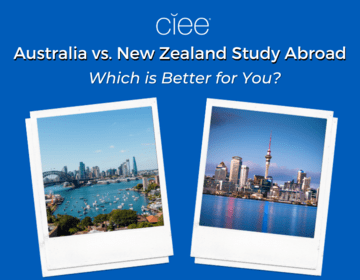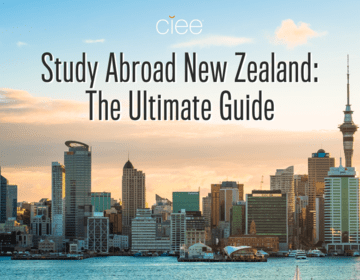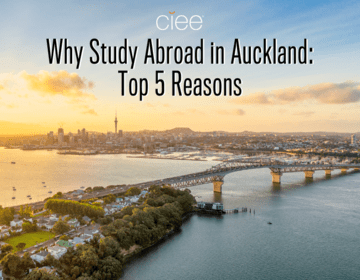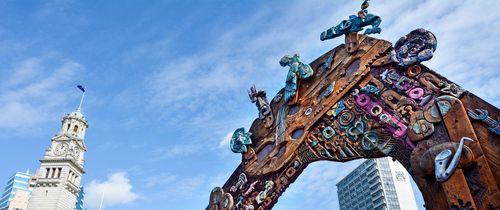
Diversity in Auckland
CIEE wants all our students to feel welcomed, supported, and empowered to succeed while studying abroad. On this page, local CIEE staff have provided details about conditions and cultural attitudes that students with specific identities might encounter at their location.
The information below is just a broad overview so if you have specific questions or concerns not covered here, please email inclusion@ciee.org. We would be glad to have local staff share their perspectives, talk with you about accommodations, connect you with resources, and/or put you in touch with a program alum who could speak about their experiences navigating a program in this location.
No matter where you choose to study abroad with CIEE, our staff—all of whom receive regular and comprehensive training in diversity, equity, and inclusion—will be on hand throughout your program to provide advice, resources, and support regarding these issues.
Body Size/Image
In Auckland, fitness and body image are prevalent topics. Many locals, especially young people, engage in various outdoor activities like hiking, kayaking, and cycling, thanks to the city's beautiful natural surroundings. The body positivity movement is strong here, and people generally avoid openly criticizing others' bodies. The city's casual dress code reflects the relaxed, outdoor-oriented lifestyle, with shorts and t-shirts being common attire.
Disability
Auckland is committed to creating an inclusive environment for all. The city features extensive infrastructure to aid mobility, including curb cuts, ramps, tactile pavement indicators, and sound cues at pedestrian crossings. Major attractions and public buildings often have wheelchair access and accommodations for hearing- and vision-impaired visitors. However, some older structures may pose accessibility challenges. Public transport, including buses and trains, offers options for disabled travelers, but it's essential to check specific routes for accessibility. Students should provide detailed information about their needs prior to arrival so that CIEE staff can arrange appropriate accommodations.
Gender and Gender Identity
New Zealand legally protects women’s rights and promotes gender equality. However, traditional gender roles still persist, with women often handling more domestic responsibilities. Gender equality has made significant strides, and women are increasingly visible in corporate and political roles. Auckland, like many global cities, experiences instances of street harassment, but efforts are ongoing to address these issues.
X Gender Marker
New Zealand supports the rights of non-binary and X gender marker individuals. The country offers a third gender option on passports and other legal documents, reflecting its progressive stance on gender identity. Non-binary and X gender marker individuals are protected under anti-discrimination laws, which cover employment, education, and public accommodations. Auckland hosts numerous community organizations and advocacy groups that provide resources, support, and connections for non-binary and X gender marker individuals. Staying informed about legal rights and available support helps ensure full inclusion and participation in the vibrant Auckland community.
Racial and Ethnic Identity
Auckland prides itself on its multiculturalism, but systemic racism remains a challenge, particularly affecting Māori, Pacific Islanders, and immigrant communities. Students of color may encounter microaggressions and underrepresentation. CIEE Auckland staff are dedicated to supporting students of all racial and ethnic backgrounds, promoting an inclusive community that values diversity. Resources and support are available to address any concerns related to racism or discrimination.
Religion
Auckland is a religiously diverse city, home to practitioners of many major faiths. Christianity is the predominant religion, with significant Roman Catholic and Anglican communities. The city also hosts active Muslim, Buddhist, Hindu, and other religious communities, offering a range of spiritual and cultural experiences.
Sexual Orientation
Auckland is known for its LGBTQIA+-friendly environment. The city celebrates diversity through events like the Auckland Pride Festival, attracting visitors from across New Zealand and beyond. Public displays of affection between same-sex partners are generally accepted in central Auckland. While New Zealand legally protects against discrimination based on sexual orientation, LGBTQIA+ individuals may still face challenges. CIEE staff provide ongoing support and resources for LGBTQIA+ students, ensuring a welcoming and inclusive experience.
Socioeconomic Status
Auckland offers various dining options to suit different budgets, from inexpensive eateries to upscale restaurants. Although the city can be pricey, careful budgeting can help manage costs. Free or low-cost cultural activities, such as visits to parks, museums, and community events, are plentiful, allowing students to enjoy Auckland's vibrant culture without breaking the bank.
Programs in Auckland
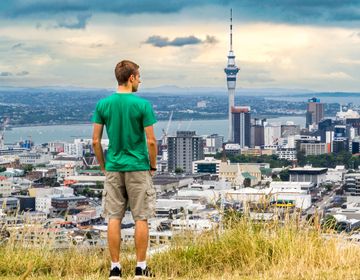
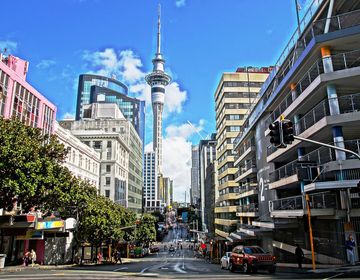
Live from Auckland
Australia vs. New Zealand Study Abroad: Which is Better for You?
You’ve decided to study abroad in the Oceania region. Congrats! You’ve taken the first big step in your study abroad journey. Next up? Choosing between Australia vs. New Zealand study... keep reading
Study Abroad New Zealand: The Ultimate Guide
Known for its rich Māori culture, majestic mountains, pristine beaches, and top-ranked universities, New Zealand study abroad is a life-changing, once-in-a-lifetime experience. From its unparalleled natural beauty to its reputation... keep reading
Why Study Abroad in Auckland: Top 5 Reasons
Are you ready for a study abroad adventure that will change your life? Picture yourself strolling along pristine beaches, hiking through lush rainforests, and immersing yourself in a vibrant cultural... keep reading
